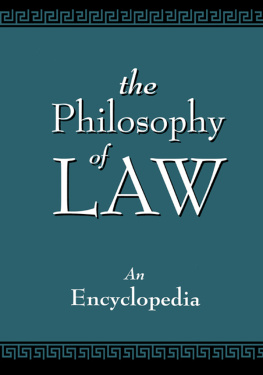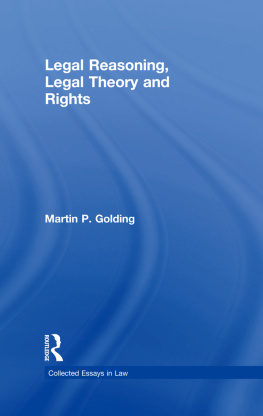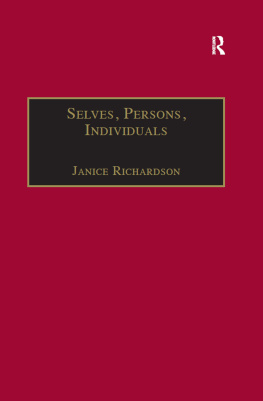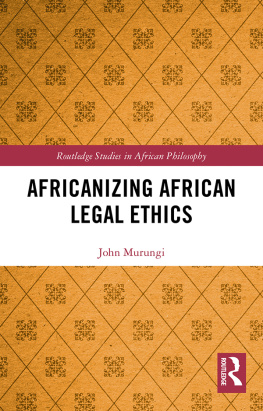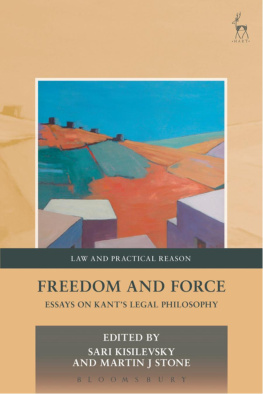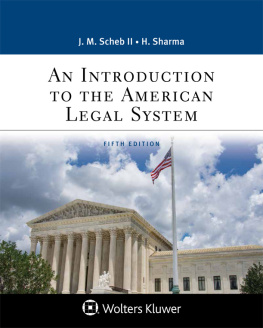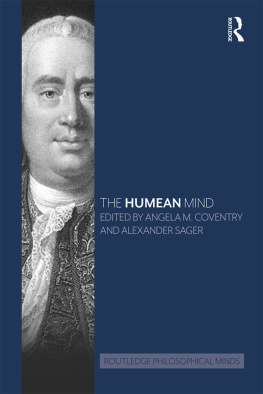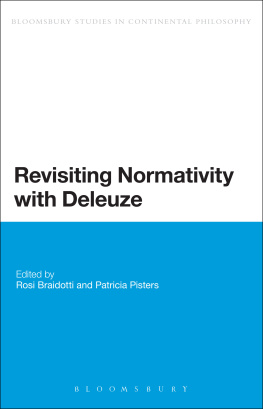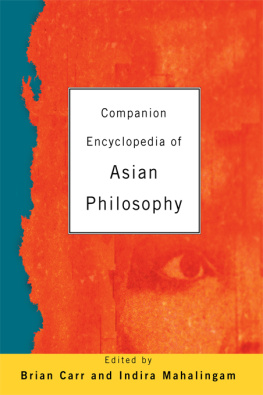The Philosophy of Law
GARLAND REFERENCE LIBRARY OF THE HUMANITIES (VOL. 1743)
The Philosophy of Law
An Encyclopedia
Volume III
AZ
Editor
Christopher Berry Gray

First published by Garland Publishing, Inc
This edition published 2012 by Routledge
Routledge
Taylor & Francis Group
711 Third Avenue
New York, NY 10017
Routledge
Taylor & Francis Group
2 Park Square
Milton Park, Abingdon
Oxon OX14 4RN
Copyright 1999 Christopher Berry Gray
All rights reserved.
Library of Congress Cataloging-in-Publication Data
The philosophy of law: an encyclopedia / editor, Christopher Berry Gray.
p. cm. (Garland reference library of the humanities ; vol. 1743)
Includes bibliographical references and index.
ISBN 0-8153-1344-6 (alk. paper)
1. LawPhilosophyEncyclopedias. I. Gray, Christopher B. II. Series.
K204.p49 1999 340.1dc21 | 99-11065 CIP |
Publishers Note
The publisher has gone to great lengths to ensure the quality of this book but points out that some imperfections from the original may be apparent.
This book is a reference for the professions of law and philosophy, for individuals interested in legal theory and the issues with which it deals, and for students who will contend with formulating a philosophical conception of law and the values that lie at its foundation. The law is a means for controlling behavior and constructing the framework within which the quality of life is defined. There is, therefore, an increasing need to understand the principles upon which it is based. The best first step for gaining such an understanding is appeal to a comprehensive reference workan encyclopediathat can present the issues that constitute the philosophy of law fairly and point the interested reader to the means for further investigation.
Interest in philosophy of law thrives today around the world. New developments in law in both age-old and more recently established nations call for a good deal of philosophical reflection. New institutional and disciplinary contexts encourage that reflection and have further increased its range. New areas of employment for practitioners of philosophy and law have opened up. An encyclopedia of philosophy of law is an essential tool for investigating the fields conventions and current developments. This encyclopedia is organized around the historically significant legal cultures, schools, and persons, as well as around the systematic daily practice of law, in order to inspire and assist thought about legal issues and thereby aid such an investigation.
Philosophy of Law: An Encyclopedia covers virtually all topics under discussion in the recent literature in philosophy of law. Though the primary focus is upon issues relevant to a North America soon to enter the twenty-first century, coverage includes the international application of core issues, often following their historical development back to ancient sources. It is not a truism that both the public and the private remain significant in legal discourse, nor that narrowly defined legal practices are just as amenable to philosophical reflection as the grand topics. The encyclopedia reflects this awareness.
The broad scope of the volume is made possible by expert contributors, over three hundred men and women from over forty countries, nearly half of them working in philosophy and nearly half in the law, as judges, jurists, or jurisprudents. In addition, the contributions of scholars from related fields in the social sciences and humanities provide an even greater breadth of perspective. Although this is an English-language work, which suggests its readership and its serviceability, contributors to this volume were chosen with an eye toward surpassing regional narrowness. They were therefore encouraged to remain cognizant of the wide-ranging application of their topic to the philosophy of law today, since questions peculiar or current to any one legal system or constitutional instrument have no a priori determinative effect upon legal philosophy.
All of the contributors are participants in the debates in which the theorists of philosophy of law engage, and (as might be expected) each has a conceptual loyalty and an inclination to promote it. However, each was directed to be as even-handed in the treatment of his or her area as is possible, and the resulting work demonstrates the seriousness with which this instruction was taken. The reader can rely upon an academic objectivity rare in modern scholarship. The book presents a comprehensive picture of contemporary philosophy of law, including studies approximating doctrinal exposition of the law on one hand, and studies near to the philosophical ethics of society on the other. As is most desirable for the neophyte philosopher of law, most entries fall within these limits. The reader can rely upon the reportage and judgment of the contributors, who are among the current practitioners in the field of philosophy of lawits working professionals.
The reader is encouraged to browse at leisure. The titles of the majority of studies in the encyclopedia are drawn from the names of the issues under discussion as they would be recognized by practitioners of the law. In the study of law, specific activities are organized by jurisdiction, and the choice of entries in the encyclopedia was made with this in mind. For example, studies on public law issues (international and constitutional, criminal and administrative) stand alongside those concerning the private law (persons and property, contracts and tort).
However, when a burning inquiry is ones motive for opening the encyclopedia, a variety of tools are available to aid the search. The book is arranged alphabetically, but in order first to place a topic in a conceptual context, the Subject List by Topic at the beginning of the book should be consulted. The scope of ones investigation might expand as a result, but consciousness of related issues always leads to a more confident understanding of a topic of interest. For those readers interested in fundamental questions, such as the status and role of knowing and the normative assumptions of the law, the subject list will serve as a guide to investigation that lays the groundwork for understanding the rationales governing legal thinking.
The entries, for all their excellence, can be only starting points for learning. Research references follow each entry in order to carry cross-referencing beyond the confines of one volume. See also notes at the end of most entries lead to related topics in the encyclopedia, pointing the reader in a more specific way to study the interconnection of the principles of law and legal theory.
Such featuresthe alphabetical organization of the encyclopedia, its subject list and reference lists, as well as a comprehensive indexcombine to facilitate inquiry: it is possible to satisfy very quickly the curiosity that first inspires the reader to draw the book from the shelf. However, this work was designed also to foster learning, to deal with issues many times over and from many points of view throughout the text. A topic is often considered once from the jurisdictional perspective in a particular locale, and again from the angle of a school of thought at some point in history; or first as the work of a prominent jurisprudent, and then as a concern for which normative and critical interpretation is offered. This is not evidence of redundancy, but of completeness, affording a well-rounded consideration of each issue and of the field as a whole.
Lest all this effort be expended to reinvent the wheel, however, a good deal of space is devoted to discussions of how these issues are dealt with in other places and at other times. Entries on current legal cultures (such as common law and civilian, European and Native American) mingle with treatments of other periods (whether Hellenistic or Sixteenth-Century or Federalist). Cutting across these issues are biographies of influential jurisprudents that include discussions of the schools or methods they launched. Several lengthy entries that provide basic factual information on the practice of legal philosophy in the modern era link these historical investigations to the aforementioned systematic essays.
Next page
